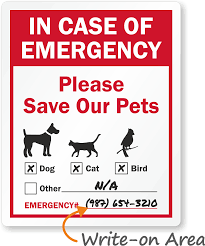3 minute read
Natural disasters like wildfires, hurricanes, or floods often strike unexpectedly. There’s no need to scramble to stay safe: prepare ahead of time!
Pet parents need to work pet safety into the preparation equation.
Dr Natalie Davis at Firehouse 183 shares practical steps to keep your family’s cats and dogs safe in an emergency.
Thinking ahead: emergency essentials for pets
Is your pet microchipped? If not, we strongly recommend it. Microchips are important for reuniting people and their pets. They are a vital link to your missing pet during emergencies or natural disasters.
For pets who are already ‘chipped, ensure your contact info is up to date. “This slips through the cracks,” says Dr Davis. “Go onto the microchip website and ensure it’s linked to your name, address, and phone number.”
Pets should also wear a collar with a rabies tag.
A few more tips include:
- Decide which family member is responsible for each pet and child during an evacuation. Designate a meet-up spot inside (or outside) your home.
- Know local evacuation routes ahead of time. And research pet-friendly hotels or boarding facilities along that route so you have a plan.
Emergency stickers
Place a sticker near your front door to alert EMS crews about pets in your home. This can be helpful during a fire. If you evacuate, update the sticker to reflect this.

- 3-5 days of food and water (for humans and pets). Water bottles for decanting.
- An extra leash, collar, poop bags, kitty litter, and pet carrier (especially for cats and smaller dogs).
- A first aid kit and towels.
- A light source (flashlights or glow sticks), a crank-powered radio, and paper maps (remember those?!).
- A photo of you with your pet for proof of ownership, essential medical records, and pet medications.
- Dr Davis has a pro tip you won’t find anywhere else: bring a t-shirt with a familiar smell. This can help your cat and dog feel calmer if you stay with family, friends, or at a hotel.
Returning to your community after a disaster comes with its own set of challenges.
Here are a few tips:
- Keep pets (especially dogs) leashed in your yard to avoid them feeling scared and running away. Keep cats in their carrier until you have a safe room for them.
- Debris, sharp objects, downed power lines, and displaced wildlife like raccoons or skunks could harm your pets.
- Check water quality. Use bottled water until tap water is deemed safe. “If you’re boiling water for your family,” Dr Davis reminds us, “boil water for your pets as well.”
- If your home has water or mold damage, clean and disinfect the areas where pets sleep to prevent illness.
Planning now can make all the difference in keeping every family member—furry or not—safe during an emergency. And remember that Firehouse is here to help you with questions you might have about your pet – on any topic. Please call us or schedule an appointment online.
